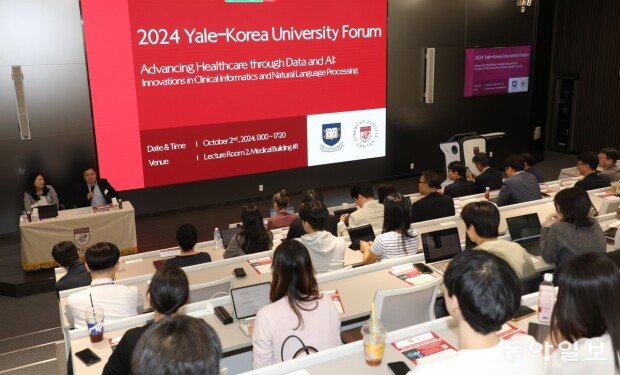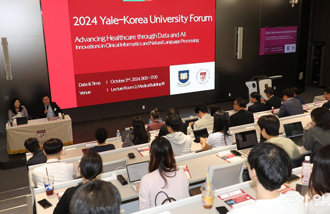'Big data-AI to become game-changer in medicine,' says professor
'Big data-AI to become game-changer in medicine,' says professor
Posted October. 03, 2024 07:19,
Updated October. 03, 2024 07:19

“With easier access to data collection through wearable devices, etc., we expect to see meaningful research that are potential game changers being more actively conducted in the future,” said Cho Cheol-hyeon, a professor of psychiatry at Korea University Anam Hospital, at the ‘2024 Yale University-Korea University Forum.’ The forum was held on Wednesday at the 1st Medical Center of Korea University School of Medicine in Seoul.
“We can use wearable devices to collect data and measure children’s mental health. Data enables more sophisticated analysis,” he said. Professor Kim introduced the principles of tracking mental health using digital biomarkers, while approximately 100 students and professors from Korea University in the auditorium listened intently, taking notes on the lecture.
The forum, titled 'Future Direction of Healthcare Development through Data and AI,' was arranged to share research trends in medical AI and advanced biomedical technology against the increased use of big data and artificial intelligence (AI) technology in the biofield. Korea University has been hosting the annual joint forum with Yale University since last year to commemorate the 120th anniversary of Korea University's founding. The forum was the third event held last year, followed by the theme on the Korean Wave (first forum) and innovation in energy, water and climate technology for a sustainable future (second forum).
During the forum's first session on Wednesday, clinical informatics and health data systems were discussed. In the second session, a presentation was delivered on the application of AI and natural language processing technology in the medical field. Professor Cho Hyung-hoon of Yale University's Department of Biomedical Science spoke on personal information protection, a much-debated issue in genomic medicine. "Genetic data is easily identifiable and prone to personal information leakage, but we can develop security devices based on personal information protection technology,” he emphasized. Experts presented new drug development methods using AI technology and the possibility of using large-scale language models in biological research.
“Artificial intelligence provides an unprecedented opportunity to innovate the treatment system,” said President Kim Dong-won of Korea University. “We hope that the forum can promote cooperation between the two universities and generate new ideas.”
박경민 기자 mean@donga.com






